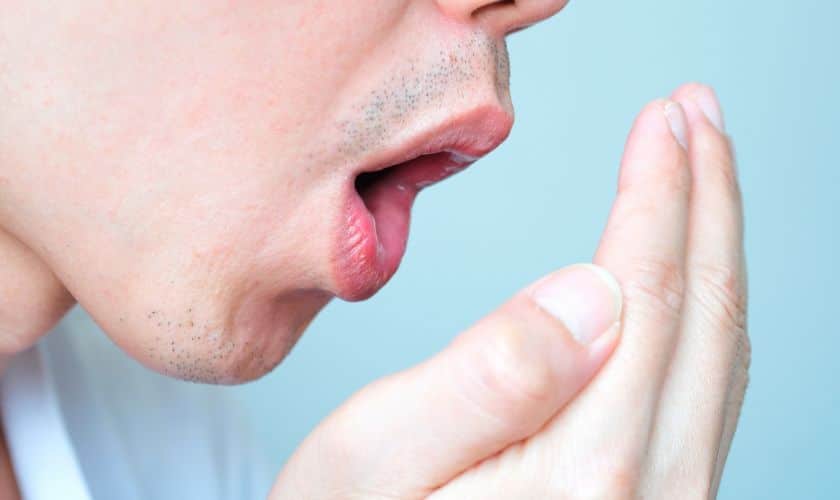Foods That Cause Bad Breath

Foods That Cause Bad Breath - Enzim Singapore
Bad breath, or halitosis, can be an embarrassing and persistent issue for many people. One of the primary contributors to bad breath is the food we eat. Certain foods can create unpleasant odours that linger long after the meal is finished. Understanding which foods can lead to bad breath is essential for maintaining fresh breath. In this article, we'll explore common culprits and how using the right bad breath toothpaste, like Enzim Freshmint Toothpaste, can help combat unpleasant odours.
The Main Offenders: Foods That Cause Bad Breath
1. Garlic
Garlic is a beloved ingredient in many cuisines, adding rich flavour to dishes. However, it contains sulfur compounds that can linger in the mouth and bloodstream long after consumption. When garlic is digested, these compounds are released into the lungs, causing bad breath. Even brushing your teeth may not completely eliminate the odour, making garlic a top contender for foods that cause halitosis.
2. Onions
Similar to garlic, onions are known for their pungent aroma, particularly when raw. Onions contain sulfur compounds that are released during chewing and digestion, leading to bad breath. The stronger the onion, the more likely it is to affect your breath, and just like garlic, the odour can persist despite oral hygiene efforts.
3. Dairy Products
Dairy products, such as milk, cheese, and yoghurt, can also contribute to bad breath. They contain proteins that can break down and release sulfur compounds, resulting in an unpleasant smell. Additionally, the bacteria in the mouth can feed on leftover dairy residues, leading to further odour.
4. Fish
Certain types of fish, particularly those high in omega-3 fatty acids, can cause bad breath due to their strong smell. Fish like salmon and tuna can linger in the mouth and lead to an unpleasant odour that can be challenging to mask.
5. Spicy Foods
Spicy foods, such as curries and dishes containing chilli peppers, can temporarily alter the scent of your breath. The spices can cause the body to release strong odours, which may not be easily eliminated by brushing or rinsing.
6. Sugary Foods and Drinks
Sugary snacks and beverages are not only detrimental to overall health but can also contribute to bad breath. When sugar is consumed, it can promote the growth of bacteria in the mouth, leading to increased plaque buildup and unpleasant odours. Candy, soda, and other sweet treats can create an environment conducive to halitosis.
7. Coffee
Coffee is a morning staple for many, but it can lead to dry mouth and bad breath. The caffeine in coffee can inhibit saliva production, leading to an increase in bacteria and odours. Additionally, the strong aroma of coffee itself can contribute to bad breath.
8. Alcohol
Like coffee, alcohol can dry out the mouth, reducing saliva production and allowing bacteria to thrive. Certain alcoholic beverages, particularly those with strong flavours, can leave a lingering scent that contributes to halitosis.
The Role of Bad Breath Toothpaste
While avoiding certain foods can help manage bad breath, maintaining a consistent oral hygiene routine is essential. This is where bad-breath toothpaste comes into play. A good toothpaste specifically formulated to combat bad breath can be a game-changer in your oral care regimen.
Why Choose Bad Breath Toothpaste?
-
Neutralising Odors: Bad-breath toothpaste is designed to neutralise the odours caused by bacteria in the mouth. Look for toothpaste that contains ingredients like baking soda, activated charcoal, or essential oils, which can help eliminate odours.
-
Antibacterial Properties: Many bad breath toothpastes contain antibacterial agents that help reduce plaque buildup and combat the bacteria responsible for halitosis.
-
Freshening Breath: These toothpaste often include flavouring agents that provide a refreshing taste, helping to keep your breath smelling pleasant throughout the day.
-
Hydration: Some formulas are designed to promote saliva production, which is crucial for maintaining oral health and fighting bad breath.
Introducing Enzim Freshmint Toothpaste
One excellent option for combating bad breath is Enzim Freshmint Toothpaste. This toothpaste features a unique enzyme-based formula that not only helps eliminate odours but also promotes overall oral health.
-
Enzymes for Odor Control: The enzymes in Enzim Freshmint work synergistically with your body’s natural processes, breaking down food particles and neutralizing odor-causing bacteria effectively.
-
Fluoride Protection: Enzim Freshmint is also fortified with fluoride, which helps strengthen enamel and protect against cavities, ensuring your mouth remains healthy while you fight bad breath.
-
Refreshing Flavor: The fresh mint flavour of this toothpaste not only keeps your breath smelling great but also enhances your overall brushing experience.
Tips for Managing Bad Breath
In addition to using bad-breath toothpaste, consider these tips to keep your breath fresh:
- Stay Hydrated: Drink plenty of water to help wash away food particles and bacteria that cause bad breath.
- Chew Sugarless Gum: Chewing sugarless gum can stimulate saliva production, helping to neutralise odours.
- Maintain Regular Dental Visits: Regular check-ups with your dentist can help identify and address any underlying issues contributing to bad breath.
- Practice Good Oral Hygiene: Brush your teeth at least twice a day and floss daily to remove food particles and plaque that can lead to halitosis.
Conclusion
Bad breath can be a distressing issue, often triggered by the foods we consume. Garlic, onions, dairy products, and sugary treats are just a few examples of common offenders that can leave your breath smelling less than fresh. However, by understanding these triggers and incorporating a high-quality bad-breath toothpaste like Enzim Freshmint Toothpaste into your oral hygiene routine, you can effectively combat unpleasant odours and enjoy a more confident smile. Remember, fresh breath starts with good choices and consistent care!



